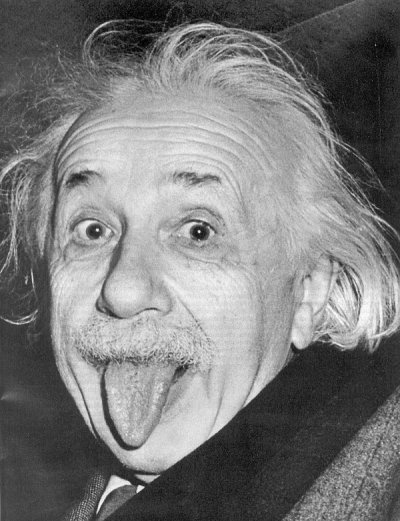A very cool article from the new issue of Scientific American Mind, which is sitting on my floor waiting to be read. Fortunately, Arts & Letters Daily pointed it out for me.
Read the whole article.High-Aptitude Minds: The Neurological Roots of Genius
Researchers are finding clues to the basis of brilliance in the brain
By Christian Hoppe and Jelena Stojanovic
Within hours of his demise in 1955, Albert Einstein’s brain was salvaged, sliced into 240 pieces and stored in jars for safekeeping. Since then, researchers have weighed, measured and otherwise inspected these biological specimens of genius in hopes of uncovering clues to Einstein’s spectacular intellect.
Their cerebral explorations are part of a century-long effort to uncover the neural basis of high intelligence or, in children, giftedness. Traditionally, 2 to 5 percent of kids qualify as gifted, with the top 2 percent scoring above 130 on an intelligence quotient (IQ) test. (The statistical average is 100. See the box on the opposite page.) A high IQ increases the probability of success in various academic areas. Children who are good at reading, writing or math also tend to be facile at the other two areas and to grow into adults who are skilled at diverse intellectual tasks [see “Solving the IQ Puzzle,” by James R. Flynn; Scientific American Mind, October/November 2007].
Most studies show that smarter brains are typically bigger—at least in certain locations. Part of Einstein’s parietal lobe (at the top of the head, behind the ears) was 15 percent wider than the same region was in 35 men of normal cognitive ability, according to a 1999 study by researchers at McMaster University in Ontario. This area is thought to be critical for visual and mathematical thinking. It is also within the constellation of brain regions fingered as important for superior cognition. These neural territories include parts of the parietal and frontal lobes as well as a structure called the anterior cingulate.
But the functional consequences of such enlargement are controversial. In 1883 English anthropologist and polymath Sir Francis Galton dubbed intelligence an inherited feature of an efficiently functioning central nervous system. Since then, neuroscientists have garnered support for this efficiency hypothesis using modern neuroimaging techniques. They found that the brains of brighter people use less energy to solve certain problems than those of people with lower aptitudes do.
In other cases, scientists have observed higher neuronal power consumption in individuals with superior mental capacities. Musical prodigies may also sport an unusually energetic brain [see box on page 67]. That flurry of activity may occur when a task is unusually challenging, some researchers speculate, whereas a gifted mind might be more efficient only when it is pondering a relatively painless puzzle.
Despite the quest to unravel the roots of high IQ, researchers say that people often overestimate the significance of intellectual ability [see “Coaching the Gifted Child,” by Christian Fischer]. Studies show that practice and perseverance contribute more to accomplishment than being smart does.
One of their conclusions hits home with me:
Whatever the neurological roots of genius, being brilliant only increases the probability of success; it does not ensure accomplishment in any endeavor. Even for academic achievement, IQ is not as important as self-discipline and a willingness to work hard.As a wee lad, I was identified as having one of those uniquely high IQs. I couldn't read until second grade, but then, seemingly all of a sudden, I was reading at a 10th grade level and doing advanced math (age 7). That all got derailed when I discovered that drugs and alcohol could numb the pain after my father died (age 13). Self-discipline and motivation disappeared for anything other than getting high (and, strangely, playing soccer).
As the integral folks might say, intellect is necessary but not sufficient for success in life. There are a great many brilliant artists, inventors, scientists, and other successful people who got there with hard work and dedication, not superior intellects.
I think we place too much emphasis on brain power.

Bill--
ReplyDeleteInteresting article about intellectual giftedness, and interesting opinion of yours about the importance of effort in making the most of whatever "brain power" one has.
Yet, I'm interested not only in gifted brains, but also in compromised brains and the learning difficulties and disabilities that result from them. One area of great interest to me, for very personal reasons, is nonverbal learning disability. What causes it, how does it impact overall intellectual ability, what are its psychological consequences, are there effective strategies for improving in these areas or circumventing them, and are there interventions or treatments--i.e., drugs, training regimens--on the horizon for this and related learning problems and attention deficits?
For instance, a prominent local neuroscientist told me that he's involved in a project to develop video games to improve visual-spatial processing in people with nonverbal learning disability.
If you come across information in this area, and in your omnivorous reading in psychology and neuropsychology you probably do or will, I'd love to see you post articles about this.
Interesting stuff and I second Nagarjuna's request. I come from a family in which both high intelligence, on the one side, and developmental disorders (namely autism) on the other, seem to go hand in hand. I myself have a very high verbal learning ability but am at an eerie deficit in spatial-visual learning -- in fact, to my embarrassment, I have trouble driving a car because I can't interpret spatial relationships between different objects on-the-fly.
ReplyDeleteI have personally seen that these skills can be improved (Tetris, believe it or not, helped me!) But they'll always be an area where "hard work and dedication" is absolutely necessary.
As an aside, despite the fact that my intellectual skills fall heavily on the verbal side of things, I prefer the companionship of animals, with whom communication is largely nonverbal. I like their LACK of emphasis on brain power!